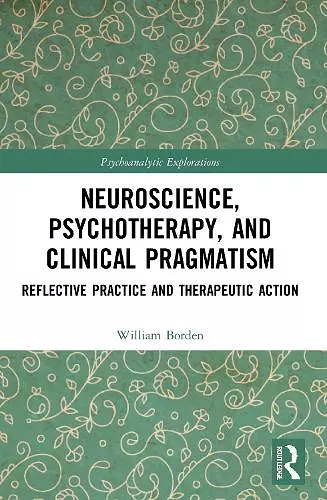Neuroscience, Psychotherapy and Clinical Pragmatism
Reflective Practice and Therapeutic Action
Format:Paperback
Publisher:Taylor & Francis Ltd
Published:26th Sep '22
Currently unavailable, and unfortunately no date known when it will be back
This paperback is available in another edition too:
- Hardback£115.00(9781138825727)

This volume explores how the principles and values of pragmatic philosophy serve as orienting perspectives for critical thinking in contemporary psychotherapy and clinical practice.
Drawing on the contributions of William James and John Dewey, Neuroscience, Psychotherapy, and Clinical Pragmatism introduces a model of clinical pragmatism emphasizing the individuality of the person, open-ended dialogue, experiential learning, and the practical outcomes of ideas and methods. In a second part, chapters show how recent developments in neuroscience and interpersonal neurobiology deepen our understanding of change and growth in accord with the principles of clinical pragmatism. Finally, the volume reviews paradigms of psychotherapy across the psychodynamic, behavioral, cognitive, and humanistic traditions. Case studies show how the pluralist orientation of clinical pragmatism enlarges concepts of therapeutic action.
This text has been written for psychotherapists as well as scholars, educators, and trainees in the fields of psychiatry, clinical psychology, counseling, and social work.
"In this monograph, Borden (Univ. of Chicago) presents an overview of historical and current perspectives in psychotherapy in light of recent research on affective neuroscience and interpersonal neurobiology. The case for pluralistic and pragmatic approaches to psychotherapy is made throughout the book but is most strongly exemplified in the concluding section ("Clinical Theories and Therapeutic Action") through case studies. Perhaps the most unique feature of this text is the clear line drawn between recent advances in the science of mind and neuroscience, as possible explanations for the long-term effectiveness of psychodynamic treatment approaches, and Borden's explanation of how these may differ on a neurological level from traditional or evidence-based cognitive-behavioral approaches. In addition, Borden formulates historical perspectives and summarizes current research in a way that makes the book an accessible pedagogical resource for both undergraduate and graduate courses in history and systems, personality, counseling, and developmental psychology. Aside from its potential usefulness for instruction, the book is a must read for current clinicians and clinical graduate students."
- G. Seror III, Dickinson State University, CHOICE Review (Highly recommended)
ISBN: 9780367701413
Dimensions: unknown
Weight: 281g
194 pages